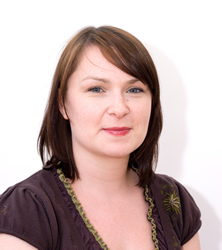I joined SCDC three years ago as an Information and Communications Officer for a national capacity building programme for community-led health. I had had limited experience of some parts of the job such as organising events and coordinating research, but there were also new things to handle, such as updating the website and delivering effective capacity building with confidence.
I have very structured support and supervision meetings with my line manager every six weeks. In the first three months of moving into my new role as Development Manager part-time while continuing as Information and Communications Officer part-time we made a few extra appointments as well. We set some learning outcomes: initially a lot of these were about confidence. I had less experience of delivery of programmes, facilitation and training so it was about me building confidence in these areas. I also hadn’t had much experience of writing about community development so we set outcomes around that.
 The chance to reflect as I progressed was good for me as I could reassure myself that I was able to do these things. We would review the work I had done and see the progress. I think setting the outcomes with my line manager was something I found really useful. I could look back and say, ‘Yeah I have done that, now I want to do it better’. And I could see how I might take advantage of the opportunities to improve around me.
The chance to reflect as I progressed was good for me as I could reassure myself that I was able to do these things. We would review the work I had done and see the progress. I think setting the outcomes with my line manager was something I found really useful. I could look back and say, ‘Yeah I have done that, now I want to do it better’. And I could see how I might take advantage of the opportunities to improve around me.
As I have a role split between two different projects we also had to look at time management. But this seemed to all fall into place and developed a natural flow.
In terms of the IT skills, I have learned things by just having a go and seeing what works. I was lucky that I was given the freedom to explore how different design applications worked and I was able to recommend that we buy certain products to improve our output. I started to research different communications solutions, such as changing our quarterly newsletter from a paper version to being an online publication, with the tools built in to our redesigned website.
Some time after I had been in post a promoted position in CHEX became available. CHEX supports a network of community-led health projects through practice development and is funded by NHS Health Scotland. We organise seminars – a recent one for example was on evidencing community-led health impact in which we looked at providing economic evidence. For this we brought together different projects to share their experience with others.
Much of the training and facilitating was new to me but SCDC is very much a learning organisation, I never felt I couldn’t ask my peers for help or information. Much of my professional development has been because of the breadth and wealth of experience around me. And I recognised that I had the opportunity, being in that environment, to learn a lot. I have had room to say, ‘I am really interested in that, can I take part?’ Or ‘I think this would be relevant to me, can I shadow you today?’ I would always be asking questions and watching and learning how different training tools were used. Then I would get the opportunity to put them into practice.
Recently I have been leading sessions using a particular technique called story dialogue. We explain how it works to the storyteller and give them guidelines. They tell a story with a beginning, a middle and an end for about seven to 10 minutes. This is about their experience, their journey. The others in the session then have a chance to ask for explanations on some points or ask further questions. The purpose is to draw out lessons on what can be learned and what action should be taken to move forward. A couple of my colleagues are very experienced in this method. And now, after learning from them, I am able to facilitate a story dialogue myself.
I remember shadowing peers who were delivering training in some of the community engagement tools such as Voice [Visioning Outcomes in Community Engagement] and LEAP [Learning Evaluation and Planning] then being able to deliver this myself and discuss how it went with them. I would say, ‘this was my experience, what do you think I should have done?’. And they would advise me. This reflective practice is most important. I kept a reflective diary and I would always ask others for input.
As well as being able to learn from people around me I would also say that volunteering has been key to my professional development. When I first started out I had experience of working as a volunteer abroad, then I volunteered in an office of an international development organisation when I came back and that gave me a lot of new experiences. It interested me so I was happy to learn about it as a volunteer. I was able to do a lot of work with refugees and asylum seekers. This kind of charity work has definitely been useful. And recently I have been involved in a local organisation where I live, trying to establish a community garden. My work experience is useful for the group and, in my voluntary work I can continue to develop my capacity building skills, which helps me at work as well. I would say volunteering is a fantastic to way to focus on CPD and it is often overlooked.
